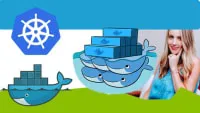
Docker Docker SWARM and Kubernetes crash course for DevOps 
This course provides an in-depth look at Docker, Docker SWARM, and Kubernetes, covering topics such as deployment, orchestration, and more. Perfect for DevOps professionals looking to gain a better understanding of these technologies. ▼
ADVERTISEMENT
Course Feature
![]() Cost:
Cost:
Free
![]() Provider:
Provider:
Udemy
![]() Certificate:
Certificate:
No Information
![]() Language:
Language:
English
Course Overview
❗The content presented here is sourced directly from Udemy platform. For comprehensive course details, including enrollment information, simply click on the 'Go to class' link on our website.
Updated in [March 06th, 2023]
This course provides an overview of Docker, Docker SWARM, and Kubernetes on Ubuntu 20.04. Participants will learn how to install and configure Docker, Docker SWARM, and Kubernetes. They will also learn how to create and use Docker Images and Containers, as well as how to deploy Docker applications manually, through managed services, or through Kubernetes. Additionally, participants will gain an understanding of complex concepts such as managing and storing data with Volumes.
[Applications]
After completing this course, students should be able to apply their knowledge to create and deploy Docker applications on Ubuntu 20.04. They should be able to use Docker SWARM and Kubernetes to manage and scale their applications. Additionally, they should be able to use Volumes to store and manage data.
[Career Paths]
1. DevOps Engineer: DevOps Engineers are responsible for managing the development, testing, and deployment of applications and services. They use a variety of tools, such as Docker, Docker SWARM, and Kubernetes, to automate processes and ensure that applications are running smoothly. As the demand for DevOps Engineers continues to grow, the need for professionals with experience in these technologies is increasing.
2. Cloud Engineer: Cloud Engineers are responsible for managing cloud-based applications and services. They use technologies such as Docker, Docker SWARM, and Kubernetes to deploy and manage applications in the cloud. As cloud computing continues to grow in popularity, the need for Cloud Engineers with experience in these technologies is increasing.
3. System Administrator: System Administrators are responsible for managing and maintaining computer systems. They use technologies such as Docker, Docker SWARM, and Kubernetes to deploy and manage applications on servers. As the demand for System Administrators with experience in these technologies continues to grow, the need for professionals with experience in these technologies is increasing.
4. Data Scientist: Data Scientists are responsible for analyzing and interpreting data. They use technologies such as Docker, Docker SWARM, and Kubernetes to deploy and manage applications that process and analyze data. As the demand for Data Scientists with experience in these technologies continues to grow, the need for professionals with experience in these technologies is increasing.
[Education Paths]
1. Bachelor of Science in Computer Science: This degree path provides students with a comprehensive understanding of computer science fundamentals, including programming, software engineering, and computer architecture. Additionally, students will learn about the latest trends in cloud computing, artificial intelligence, and machine learning.
2. Bachelor of Science in Information Technology: This degree path focuses on the application of technology to solve business problems. Students will learn about the design and implementation of information systems, as well as the development of software applications. Additionally, students will gain an understanding of the latest trends in cloud computing, big data, and cybersecurity.
3. Master of Science in Computer Science: This degree path provides students with an advanced understanding of computer science fundamentals, including programming, software engineering, and computer architecture. Additionally, students will learn about the latest trends in cloud computing, artificial intelligence, and machine learning.
4. Master of Science in Information Technology: This degree path focuses on the application of technology to solve business problems. Students will learn about the design and implementation of information systems, as well as the development of software applications. Additionally, students will gain an understanding of the latest trends in cloud computing, big data, and cybersecurity.
Course Syllabus
Docker Global architecture
Docker Install on Ubuntu 20.04
Docker Hub Public registry
Add container Image
Basic commands
Build new image
Port Mapping
Container volume mapping
Docker Network
Docker Compose
Pros & Cons

Good explanation and comprehensive content

Appreciated by learners

Content is suitable for basic knowledge

Accent not clear

Not for beginners

Difficult to understand
Course Provider

Provider Udemy's Stats at AZClass
Discussion and Reviews
0.0 (Based on 0 reviews)
Explore Similar Online Courses

Introduction to Yoga and Applications of Yoga

CSIR NET Problems and answers

Python for Informatics: Exploring Information

Social Network Analysis

Introduction to Systematic Review and Meta-Analysis

The Analytics Edge

DCO042 - Python For Informatics

Causal Diagrams: Draw Your Assumptions Before Your Conclusions

Whole genome sequencing of bacterial genomes - tools and applications

Managing Docker on Linux Servers

Fundamentals of Docker and Kubernetes for NET Developers

WSL 2 Docker Kali Linux and Windows Terminal - get started
 Related Categories
Related Categories
 Popular Providers
Popular Providers
Quiz
 Submitted Sucessfully
Submitted Sucessfully
1. What is the operating system used in this course?
2. What is the main purpose of this course?
3. What is the most important concept covered in this course?


Start your review of Docker Docker SWARM and Kubernetes crash course for DevOps